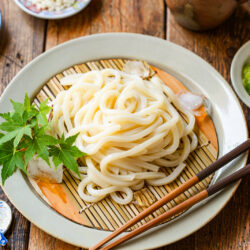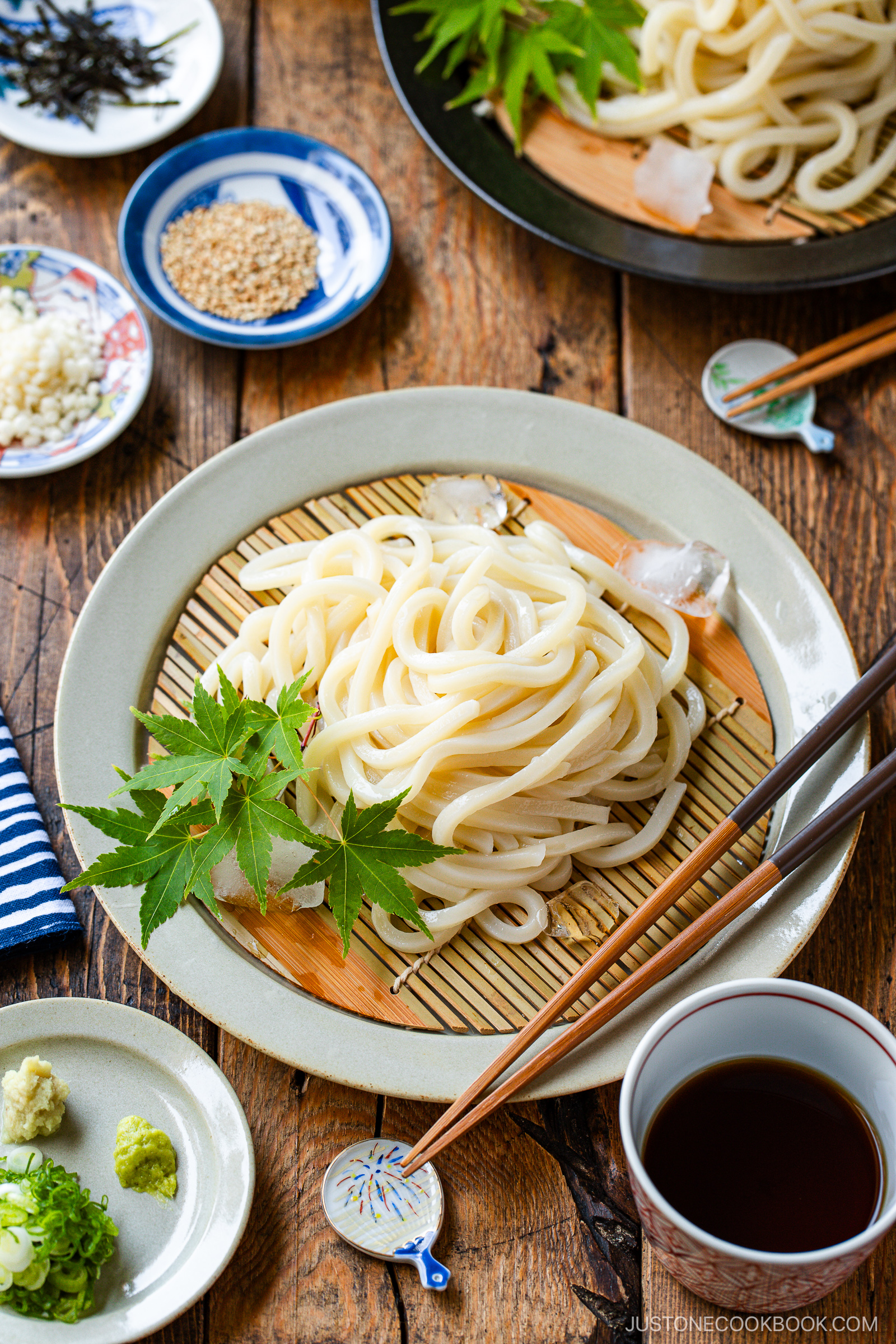
When the summer weather gets hot and you don’t have much of an appetite, try this delicious Cold Udon Noodles (Zaru Udon) recipe. Classic fare during the hot and humid summers in Japan, these chilled noodles are so refreshing and simple to prepare, especially when you don’t feel like cooking! I’ll show you how to make the savory dipping sauce two ways—either from scratch or with store-bought noodle soup base.
If you love udon, try my Beef Udon, Yaki Udon (Stir-Fried Udon Noodles), and Kitsune Udon recipes next!
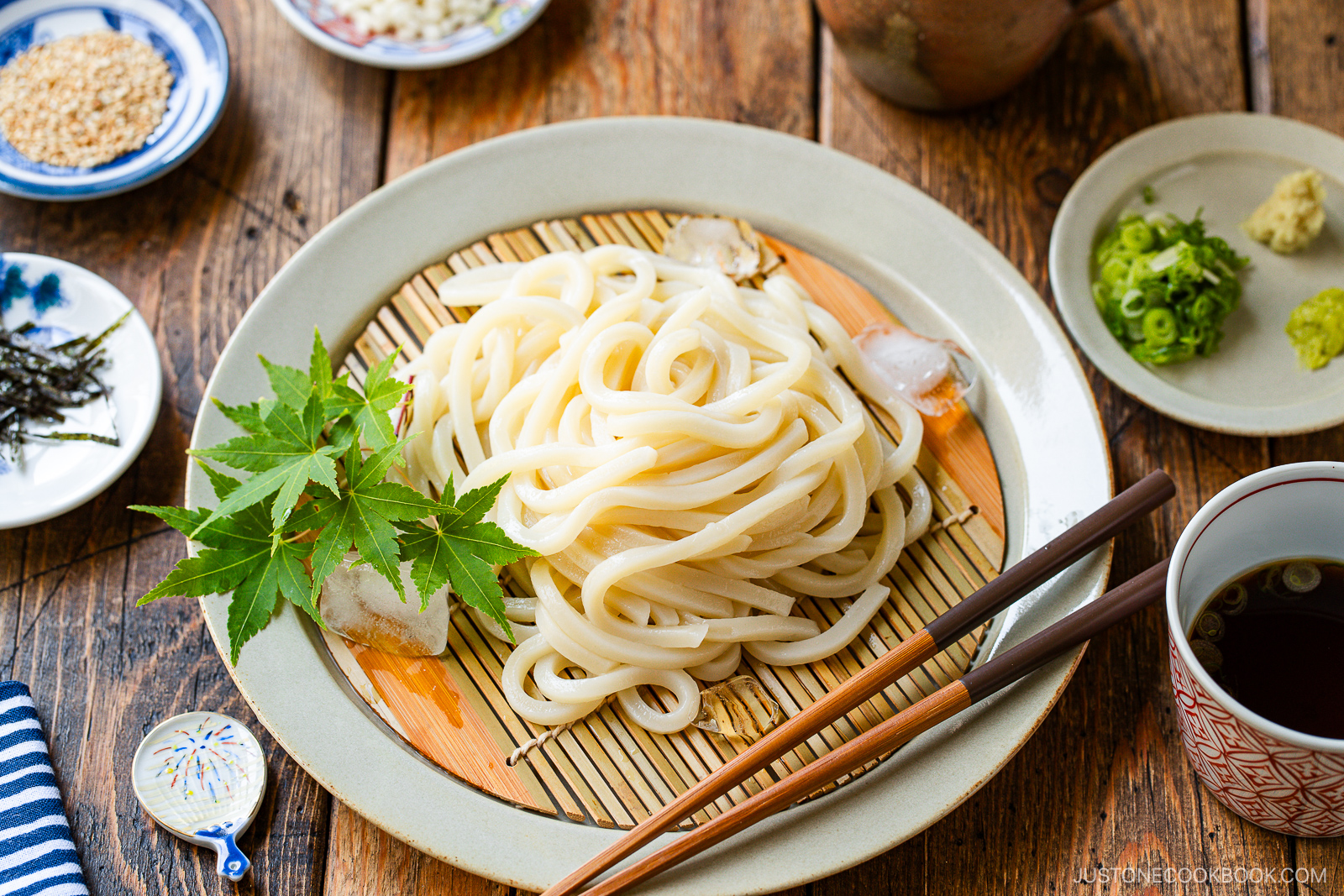
What is Cold Udon Noodles (Zaru Udon)?
Cold udon noodles (zaru udon, ざるうどん) is a dish that we serve in Japan during the summer months when the weather is hot and humid. The chilled noodles taste refreshing when served with savory mentsuyu dipping sauce and toppings like green onions, ginger, and wasabi. This dish is the cold version of Kake Udon that’s served hot with dashi broth and sliced green onions on top.
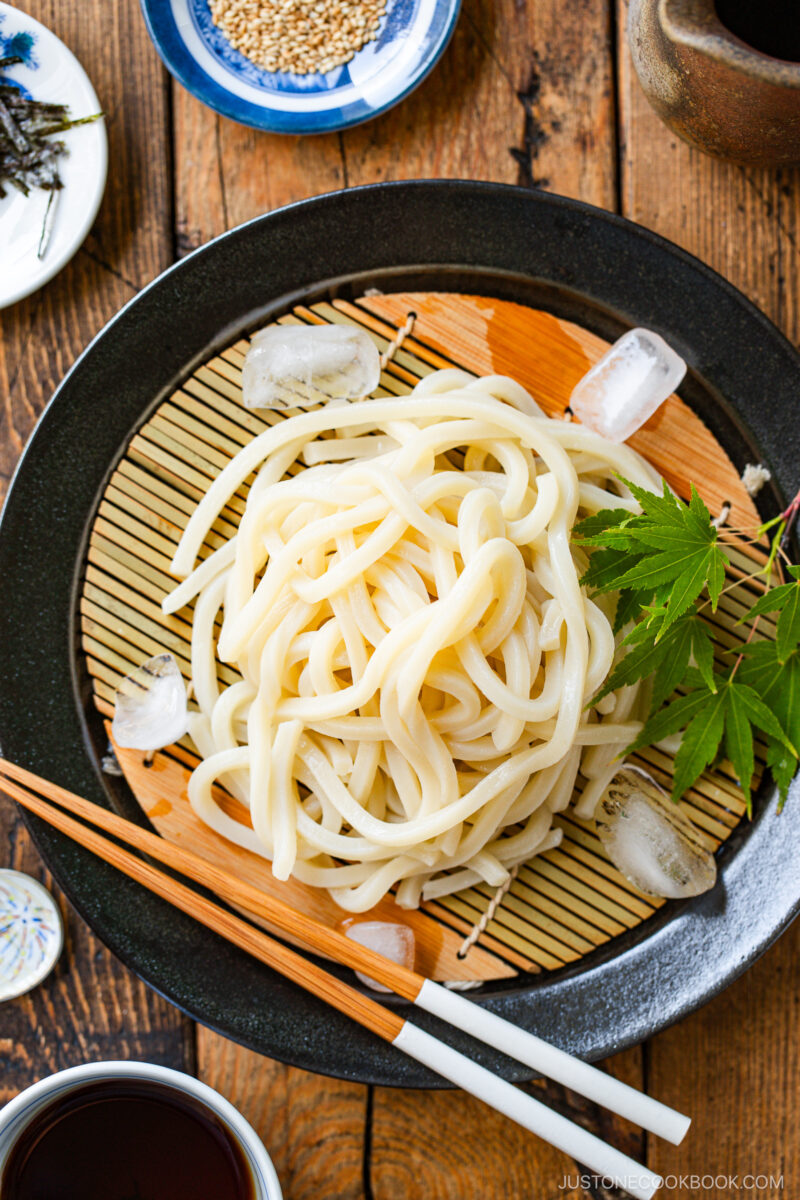
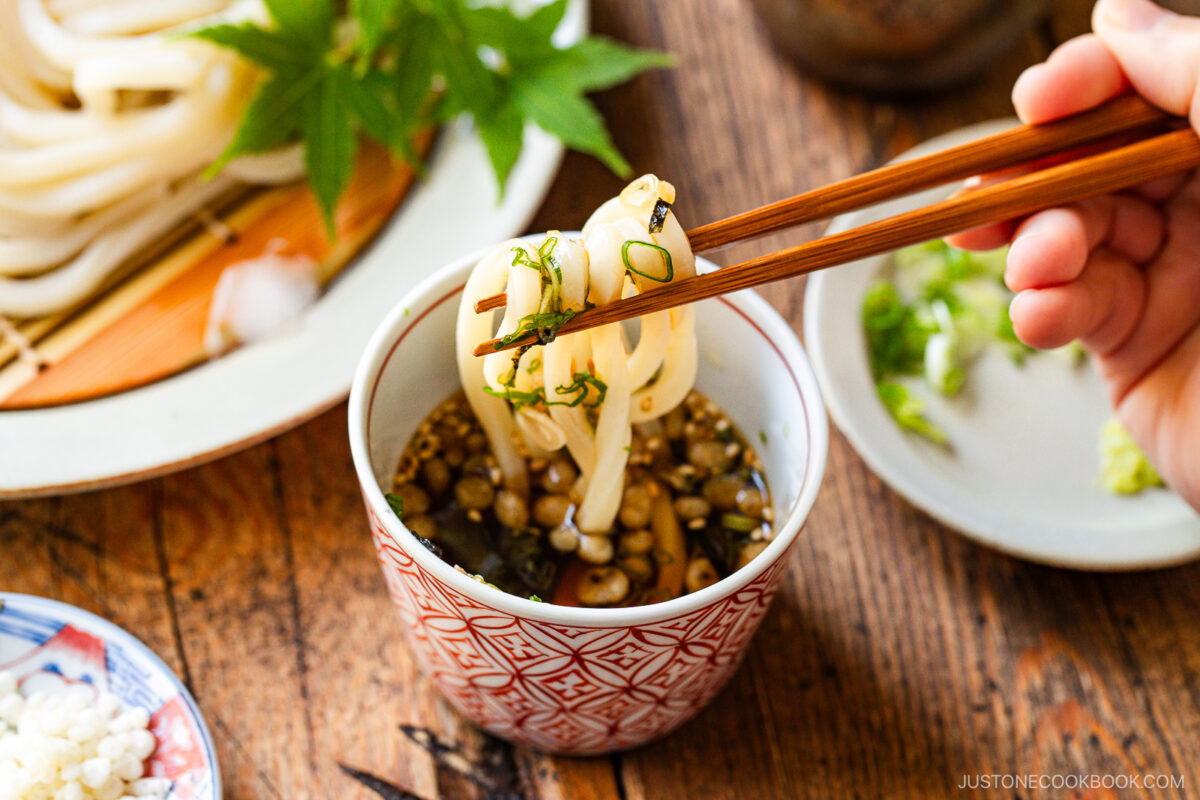
Ingredients for Cold Udon Noodles (Zaru Udon)
- udon noodles – frozen
- Homemade dipping sauce (tsuyu):
- dashi (Japanese soup stock) – Use a dashi packet or make Awase Dashi or Vegan Dashi from scratch
- mirin
- soy sauce
- sugar
- Condiments:
- green onion/scallion
- ginger
- wasabi (optional)
- (Optional) Quick dipping sauce:
- water and mentsuyu (concentrated noodle soup base) – bottled
- kombu (dried kelp)
- katsuobushi (dried bonito flakes)
Find the printable recipe with measurements below.
Jump to Recipe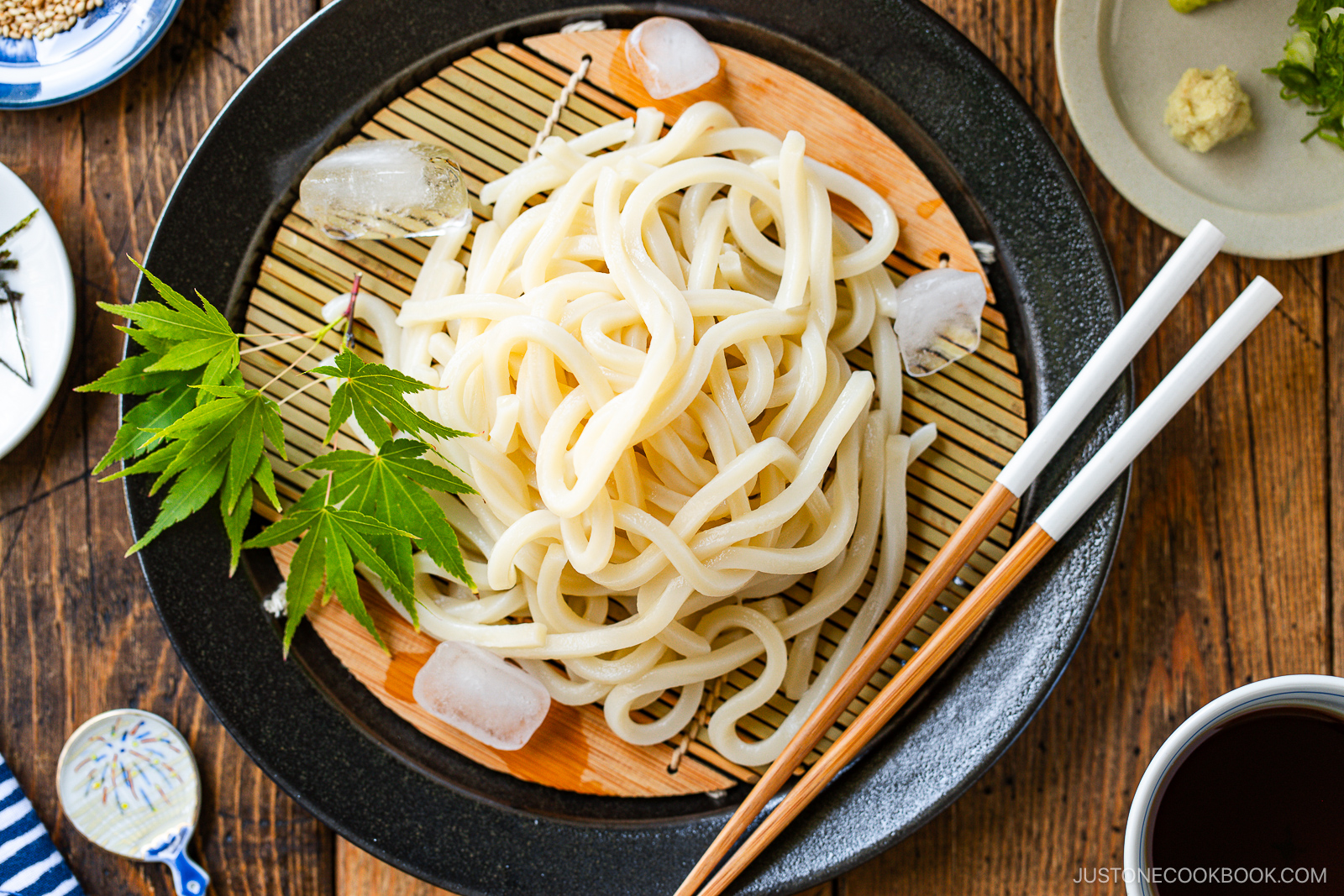
How to Make Cold Udon Noodles (Zaru Udon)
Dipping Sauce
- Make the dipping sauce. Simmer dashi stock, sugar, and mirin in a small saucepan over medium heat. Then add soy sauce. Cool completely.
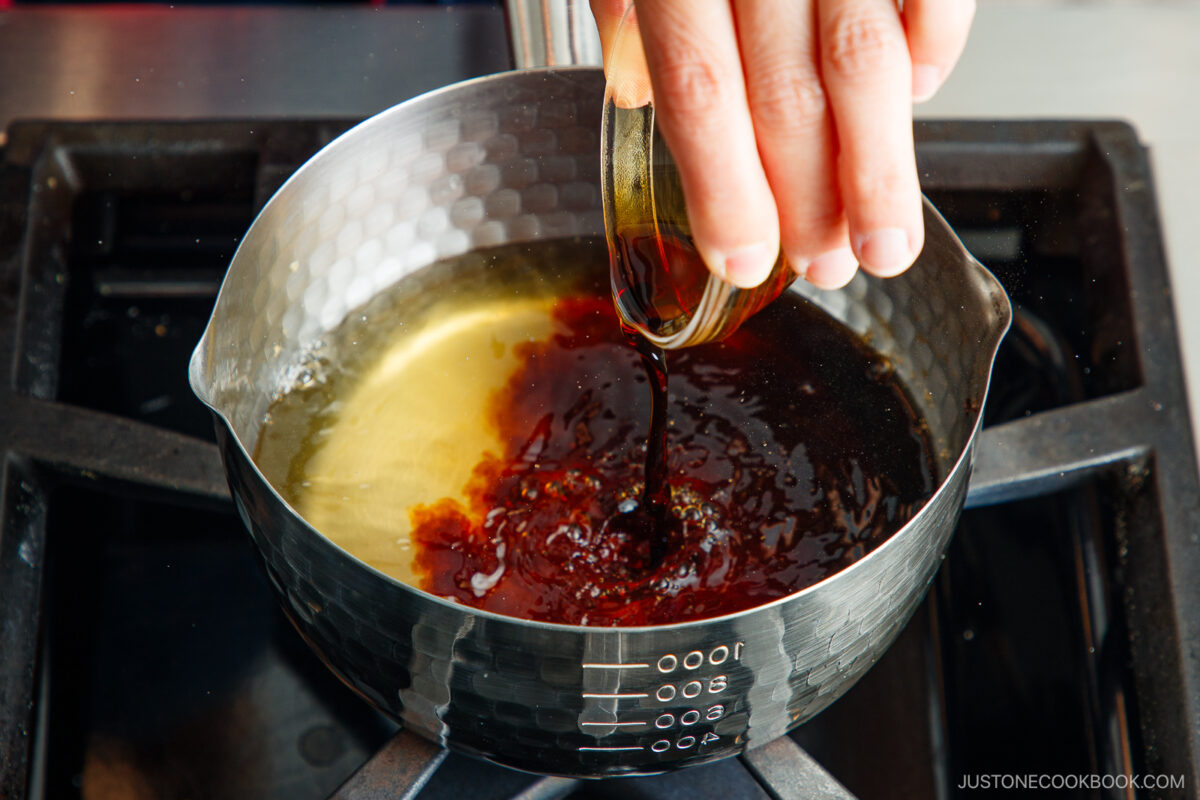

Noodles
- Heat the udon noodles. Place the frozen noodles in a large pot of boiling water until heated through. If you’re using dried udon noodles, cook according to the package instructions.
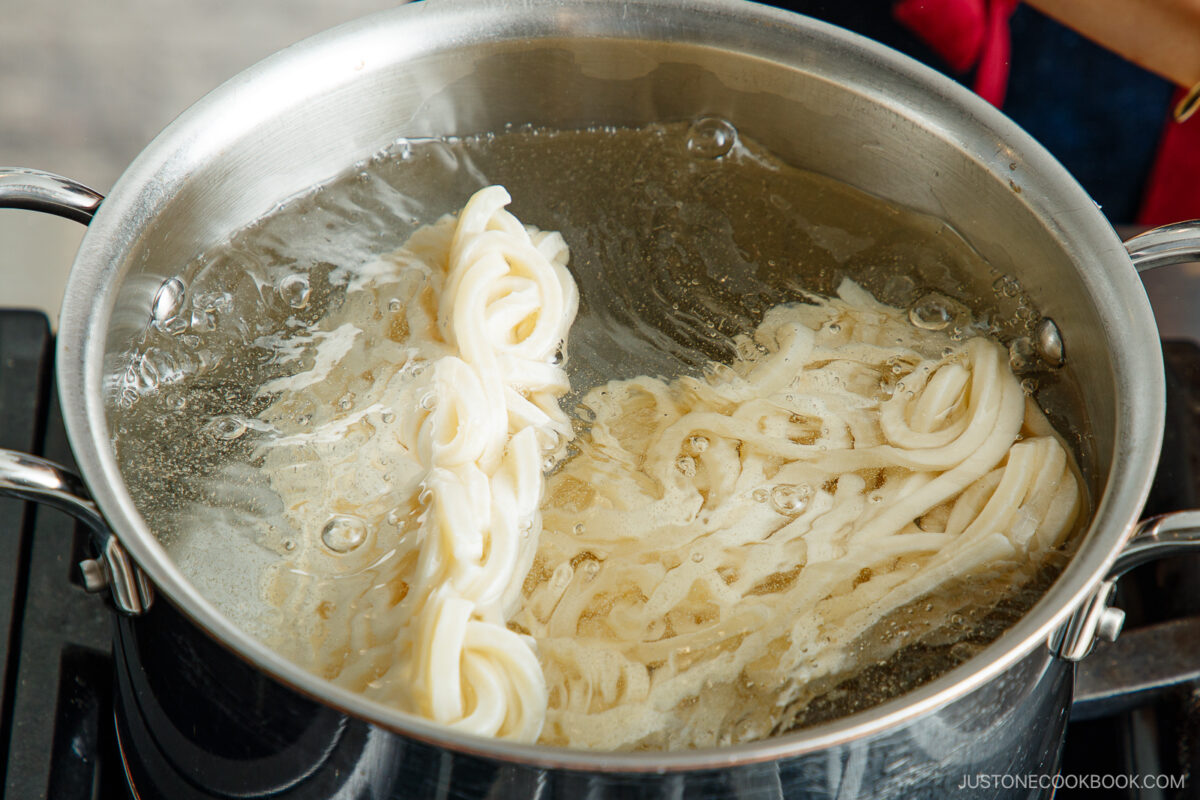
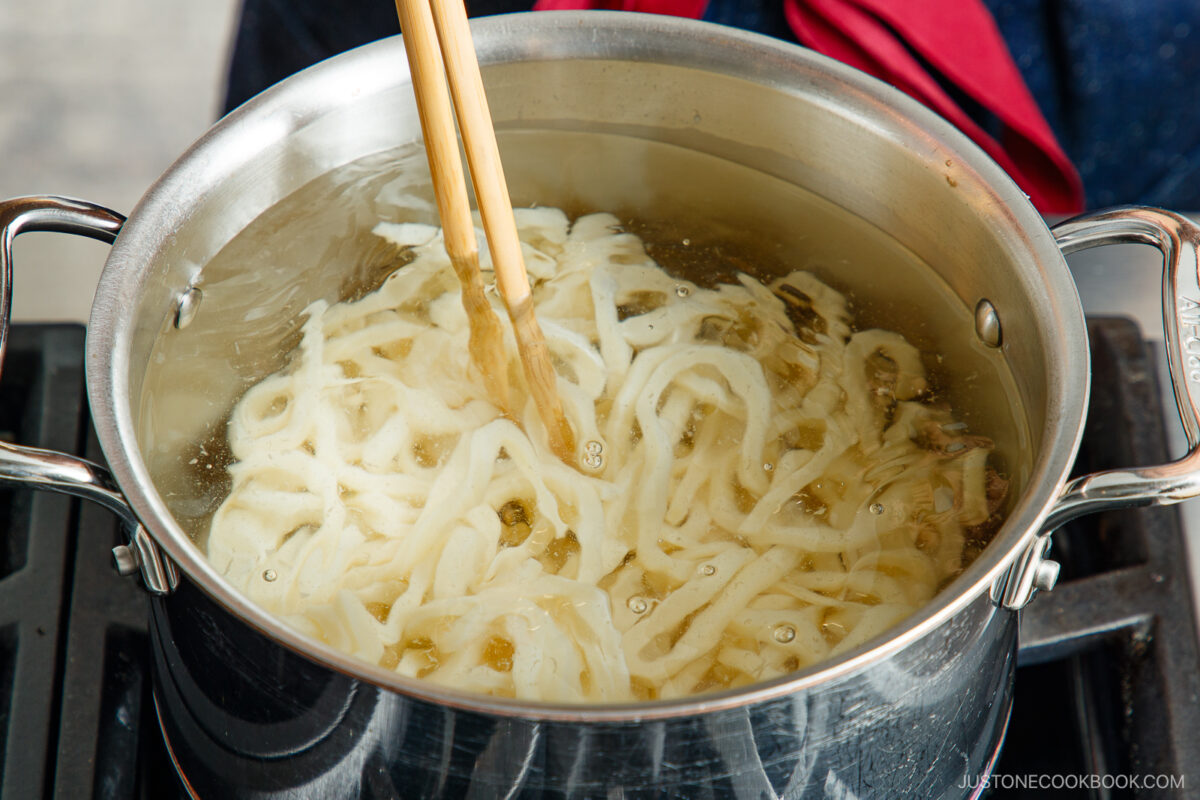
- Rinse and cool. Drain the noodles in a sieve and rinse under cold water. Then, add the noodles to an ice bath for 30–60 seconds, then drain. If you chill too long, the noodles become too firm.
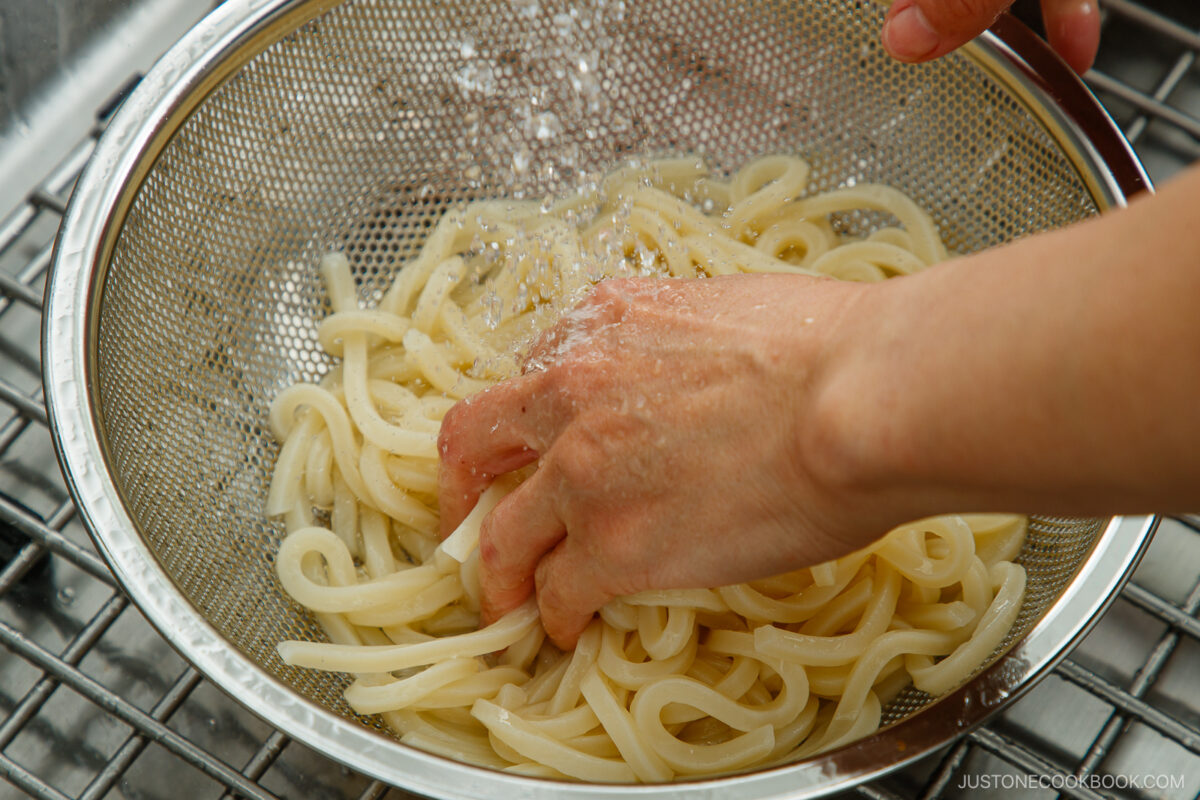
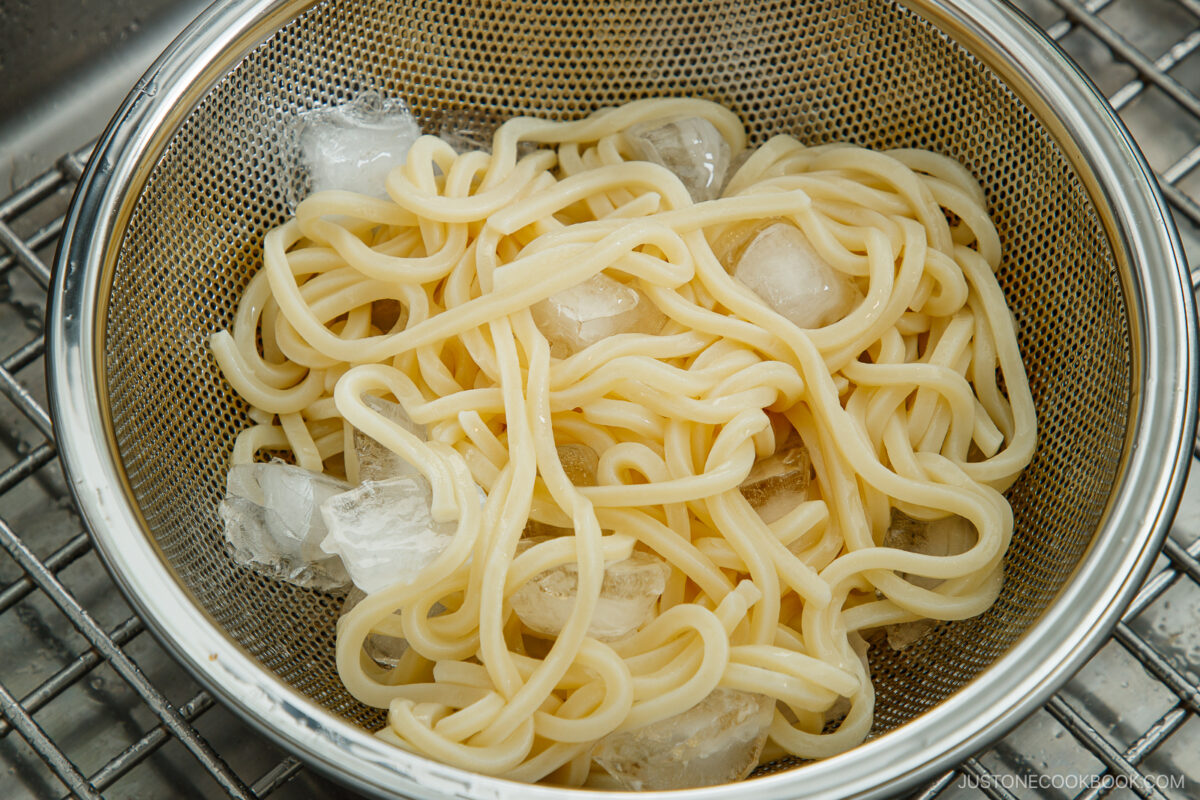
Condiments
- Prepare the condiments. Thinly slice the green onion and grate the ginger. Put them on individual small plates.
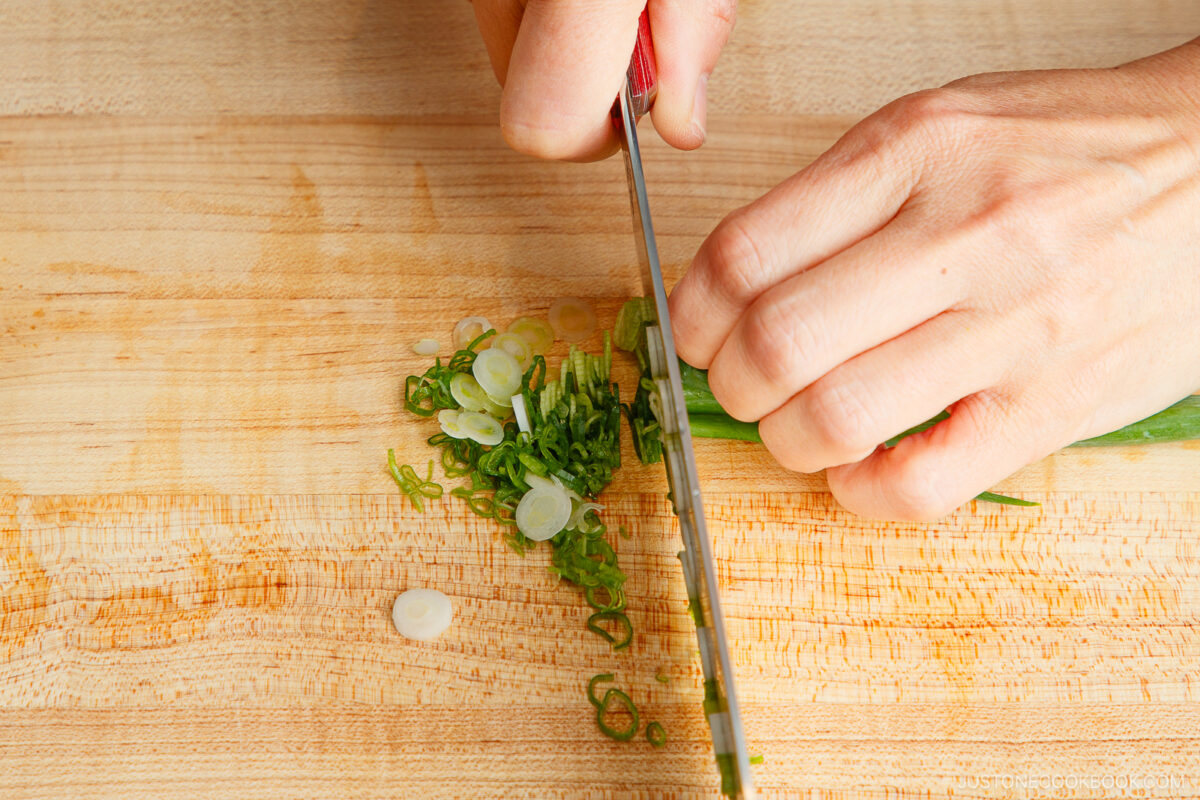
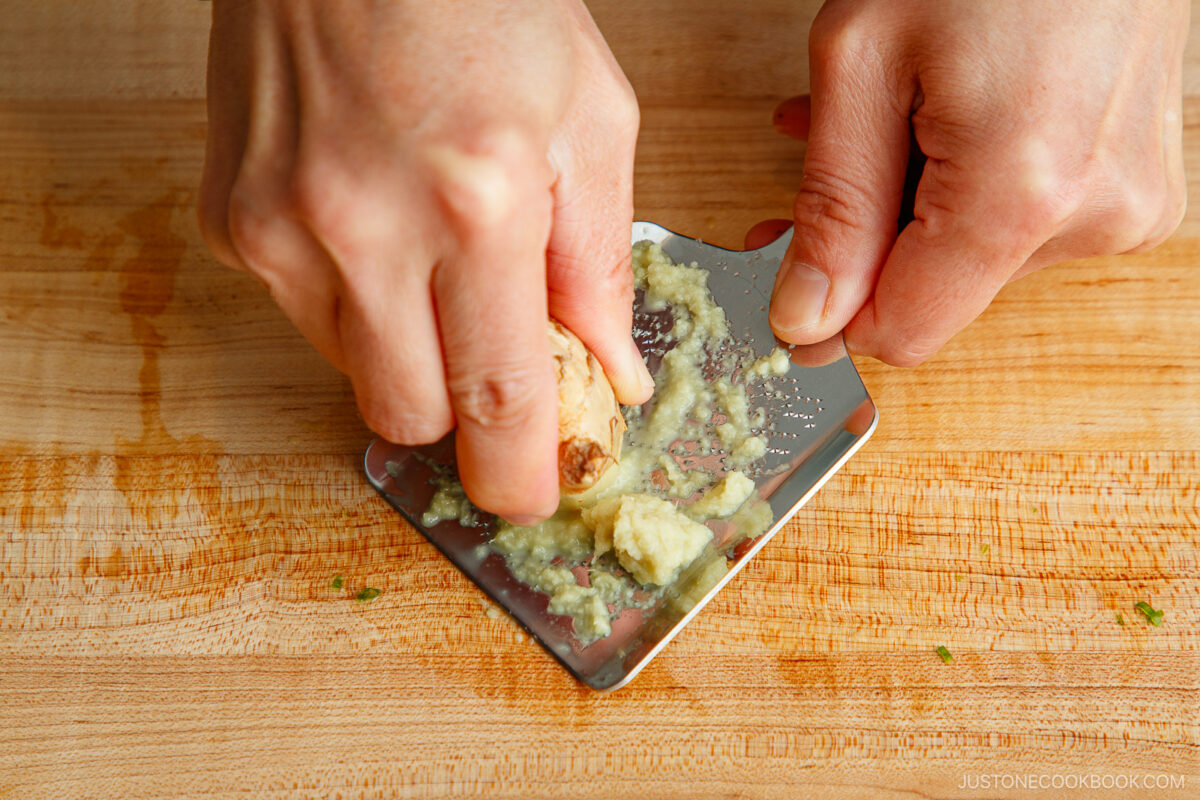
Assemble
- Drain and divide the chilled noodles and ice cubes onto individual plates. Pour the sauce into individual cups. Serve with condiments on the side. Add green onion, ginger, and optional wasabi to the sauce, dip the noodles, and enjoy.
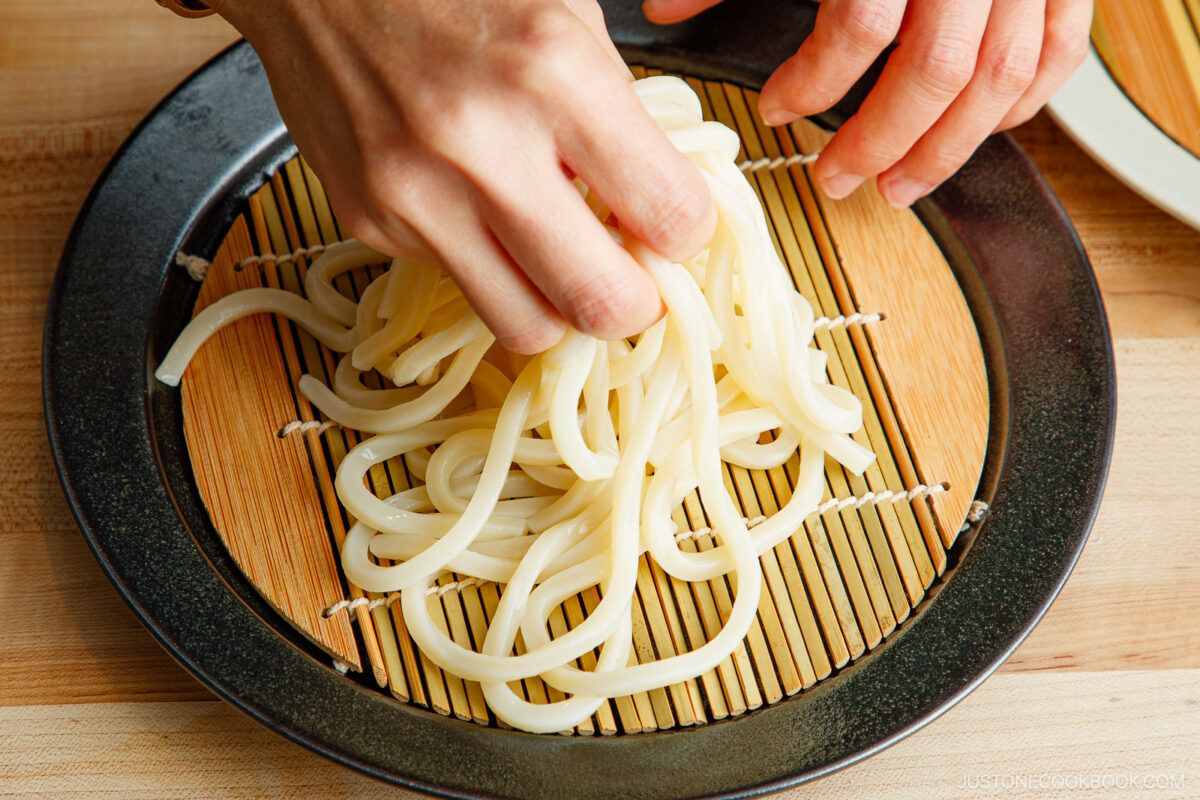
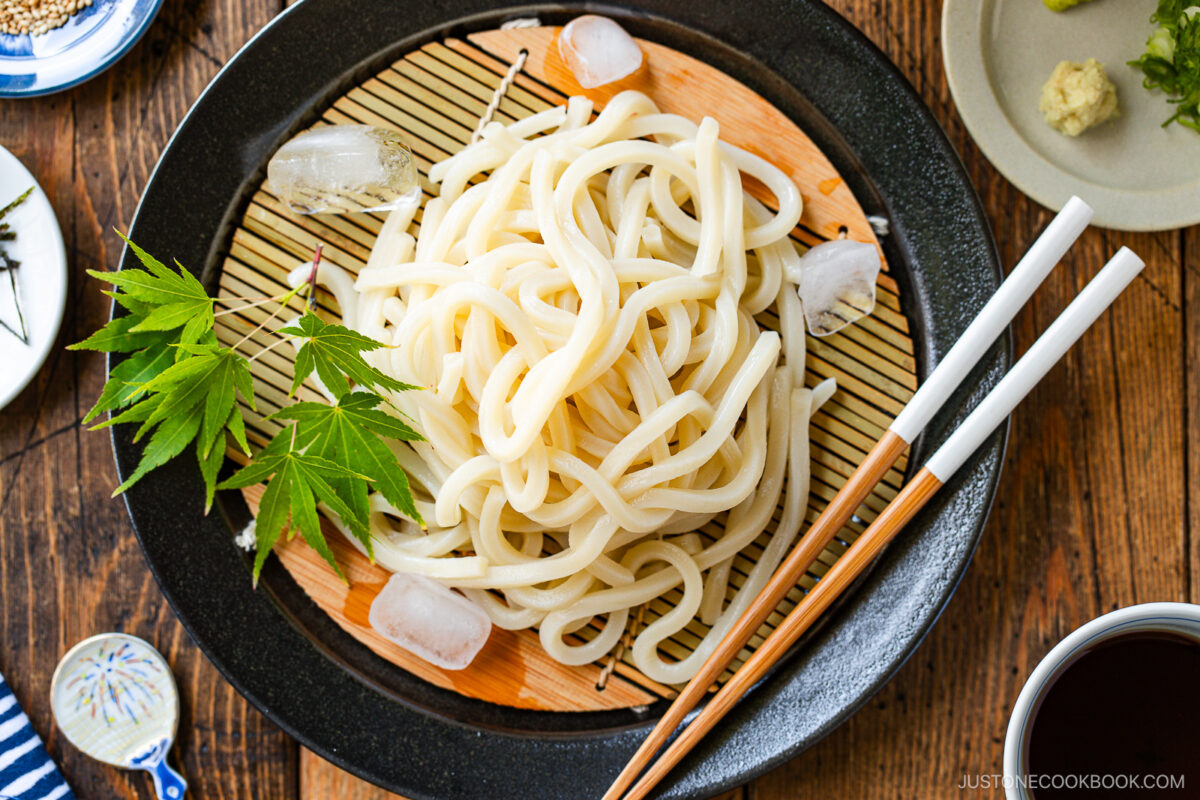
Nami’s Recipe Tips
- Make the tsuyu from scratch – I recommend making homemade dipping sauce for the best flavor, but you can use store-bought mentsuyu to save time.
- Cool the sauce – After simmering it on the stove, make sure to cool down your dipping sauce completely before serving. I rest the pitcher of dipping sauce in a bowl of ice to chill it.
- Use frozen udon – I recommend my favorite frozen Sanuki udon from the Japanese market. Alternatively, Hime Dried Udon is a decent dried substitute from Amazon. If you have the time, Homemade Udon Noodles are delicious!
- Rinse the noodles – Run the hot noodles under cold tap water while tossing them with your hands like you’re washing clothes. This cools them down and removes any excess starch.
- Chill briefly – Add the rinsed and cooled noodles to an ice bath with plenty of ice cubes for 30–60 seconds, then drain. If you chill too long, the noodles become too firm.
- Serve with ice cubes – Add some of the ice cubes to the udon plates to keep the noodles cold and super refreshing.
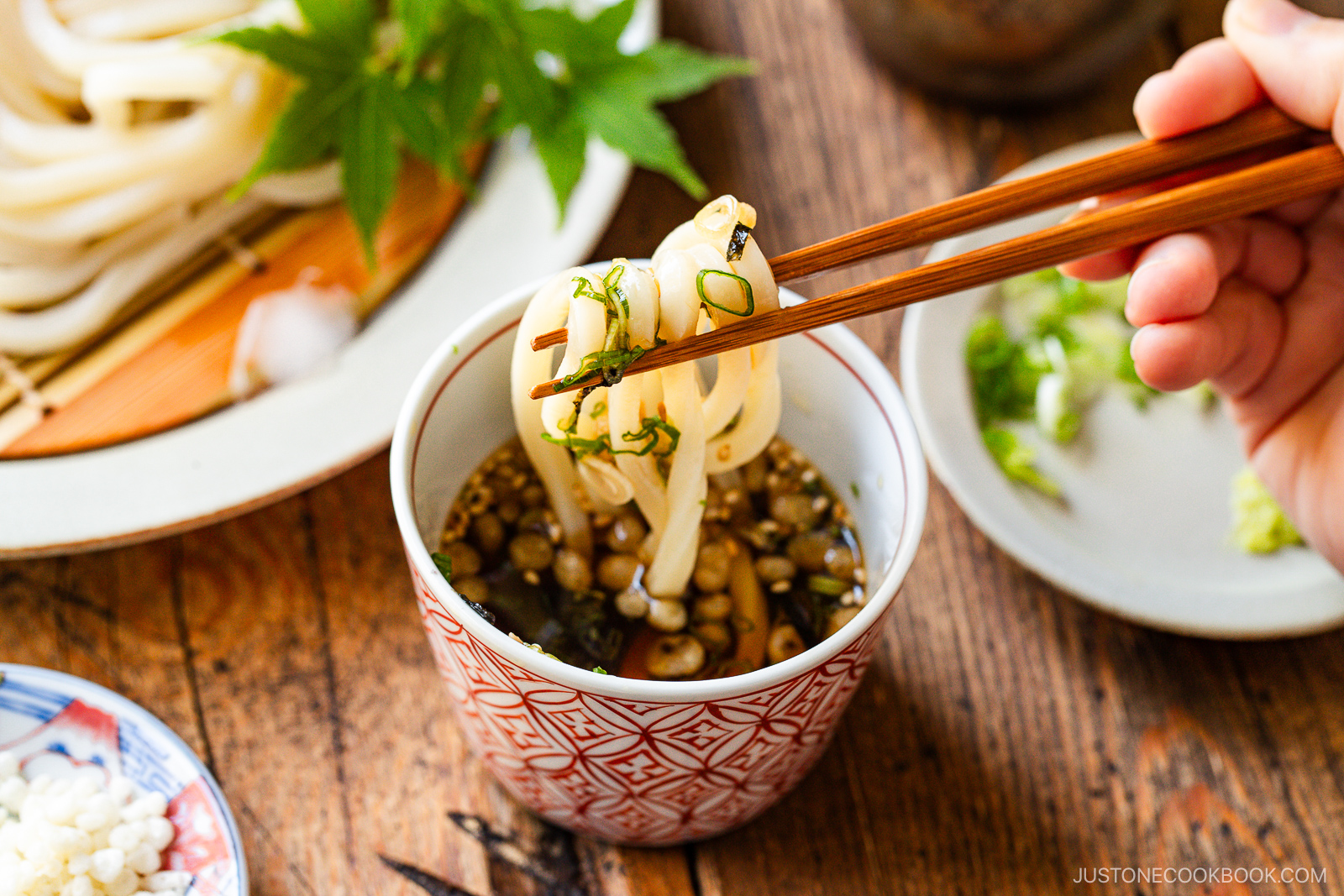
Variations and Customizations
Get creative with your toppings. Also, the Japanese enjoy other cool udon dishes during the summertime. Here are some popular variations that you can try.
- Extra toppings like shredded nori, tenkasu (tempura scraps), julienned shiso, and toasted sesame seeds
- Cold Tanuki Udon with tempura scraps, tomatoes, cucumbers, wakame seaweed, and boiled egg
- Cold Natto Udon with fermented soybeans has the delightful texture of Japanese neba neba (ネバネバ, slimy) foods
- Cold Curry Udon in chilled curry soup with sliced pork and summertime vegetables

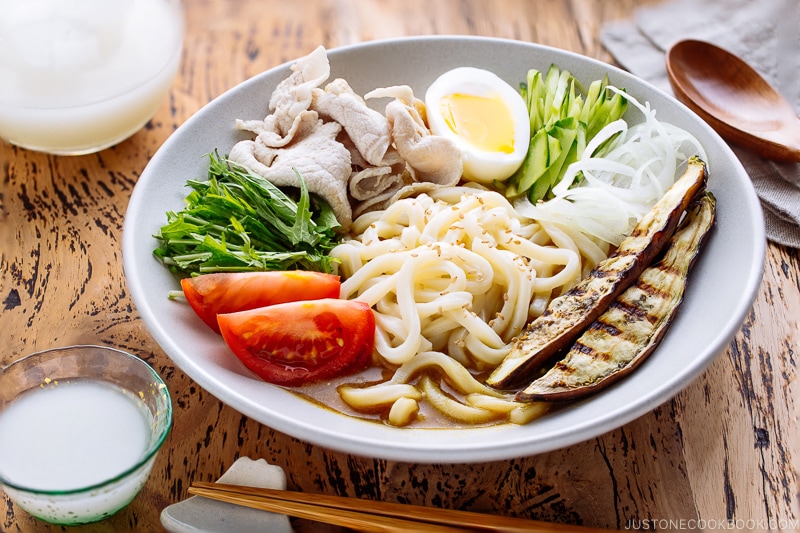
What to Serve with Cold Udon Noodles (Zaru Udon)
- Tempura – Learn How to Make the Best Tempura for a classic pairing called tenzaru udon.
- Salad – Green salad drizzled with Carrot Ginger Dressing is cooling and refreshing.
- Japanese barley tea – Chilled Mugicha is a summertime favorite drink for adults and kids alike.
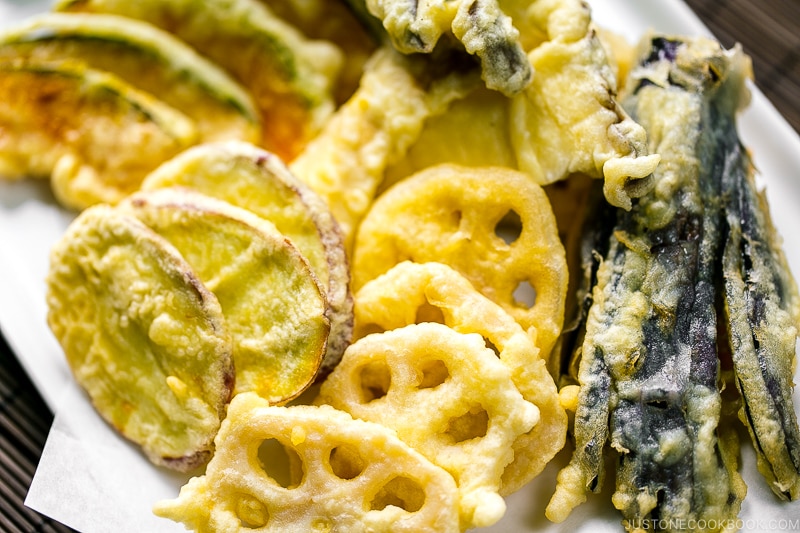

Storage Tips
To store: Store leftover dipping sauce in a clean, airtight container in the fridge for up to a month. I recommend cooking the udon noodles just before serving.
Cold Udon Noodles (Zaru Udon)
Ingredients
- 2 servings udon noodles (1.1 lb, 500 g frozen or parboiled noodles; 6.3 oz, 180 g dry noodles; or 10.6 oz, 300 g Homemade Udon Noodles)
For the Homemade Dipping Sauce (Tsuyu)
- ⅔ cup dashi (Japanese soup stock) (use Awase Dashi or Vegan Dashi, or make it using a dashi packet or dashi powder)
- 2 Tbsp mirin
- 1 tsp sugar
- 2 Tbsp soy sauce
For the Condiments
- 1 green onion/scallion
- ½ inch ginger
- wasabi (optional)
- toppings of your choice (optional: shredded nori, tenkasu, toasted white sesame seeds)
(Optional) For the Quick Dipping Sauce
- ½ cup mentsuyu (concentrated noodle soup base) (bottled; the brand I use is concentrated 3 times for cold noodle dipping sauce)
- 1 piece kombu (dried kelp) (5 g; 2 x 2 inches, 5 x 5 cm per piece)
- ½ cup katsuobushi (dried bonito flakes) (packed)
- 1½ cups water (or follow the dilution instructions on the bottle)
Instructions
- Gather all the ingredients. Here, I show what you'll need to make homemade tsuyu (noodle dipping sauce). To prepare a quick dipping sauce instead using bottled mentsuyu (concentrated noodle soup base), see my optional recipe at the end.
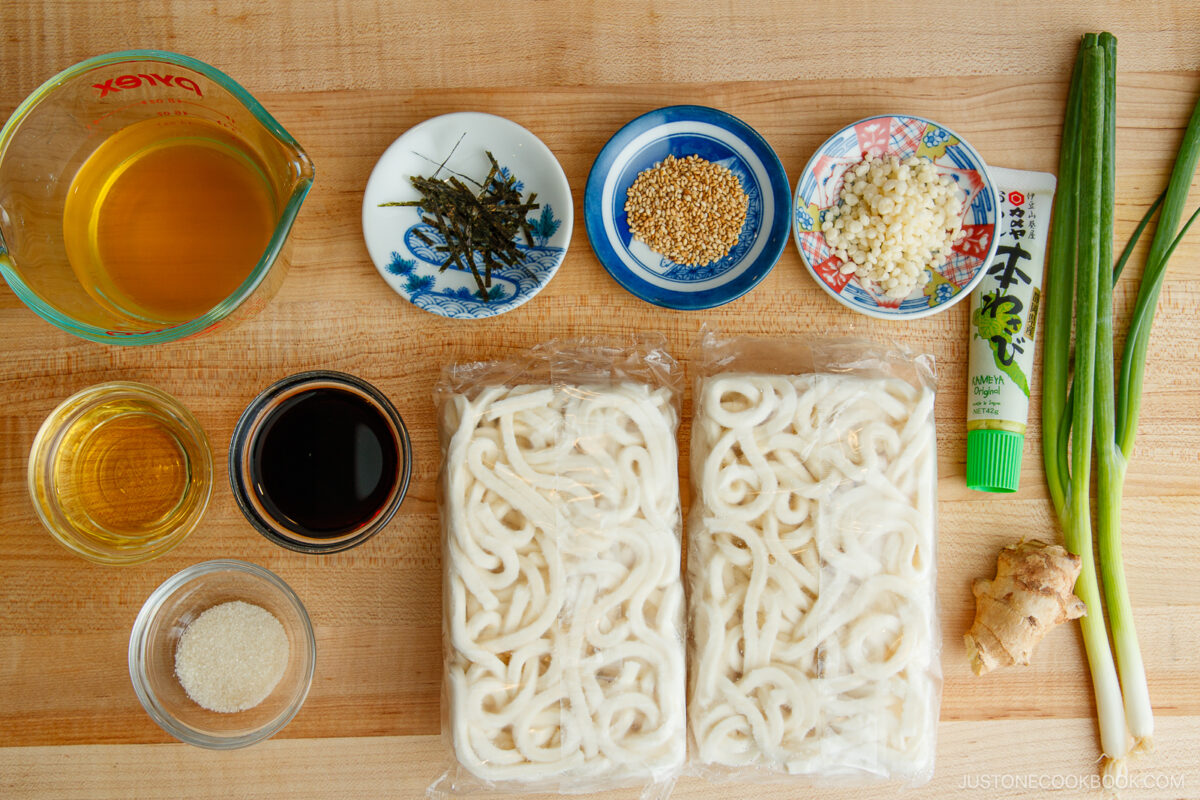
To Make the Homemade Dipping Sauce (Tsuyu)
- Add ⅔ cup dashi (Japanese soup stock), 2 Tbsp mirin, and 1 tsp sugar to a small saucepan. Bring it to a simmer over medium heat and stir to dissolve.
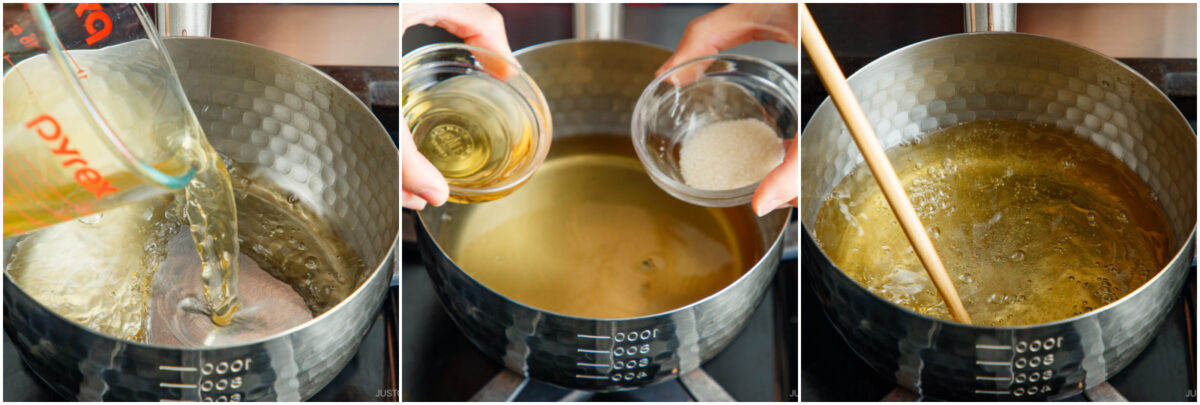
- Next, add 2 Tbsp soy sauce. Bring it back to a simmer, then turn off the heat. Transfer to a heat-resistant container or serving pitcher and set in a bowl of ice to let cool (you can make it ahead and keep in the fridge).
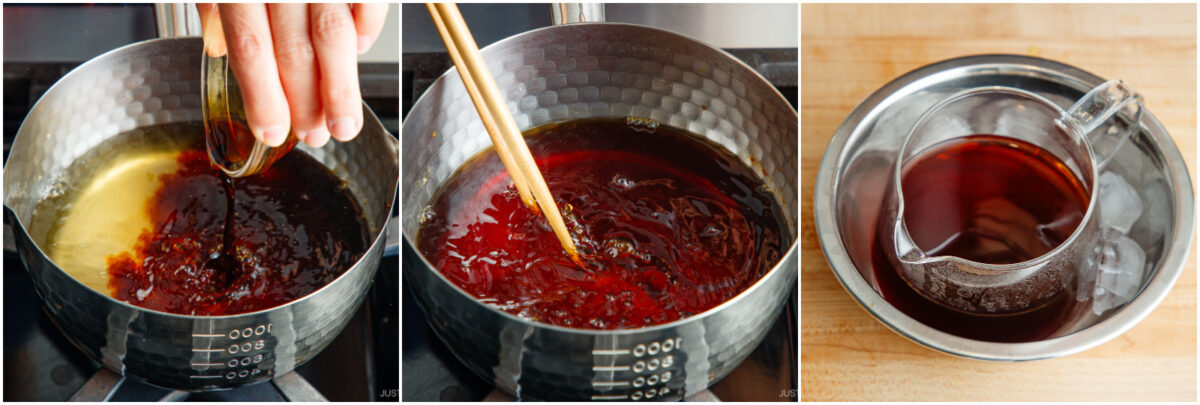
To Prepare the Noodles
- Bring a large pot of water to a boil. Add 2 servings udon noodles (frozen; no need to defrost) and boil for 1 minute to heat through. Nami's Tip: I use my favorite frozen Sanuki udon from the Japanese market. Alternatively, Hime Dried Udon is a decent option from Amazon; cook according to package directions.
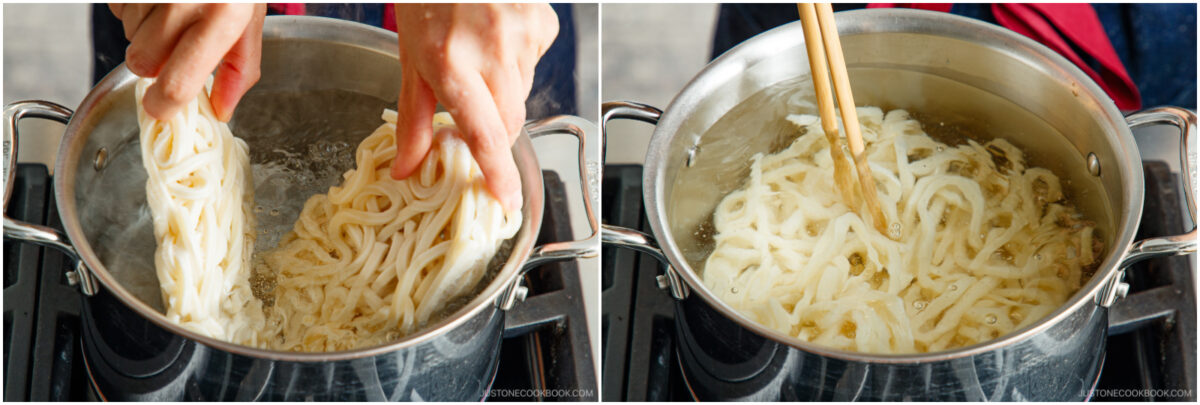
- Drain in a sieve. Thoroughly rinse off the udon's starch under running water until they’re no longer slippery. Once cool, place the noodles in an ice bath to chill for 30–60 seconds (if you chill too long, the noodles become too firm).
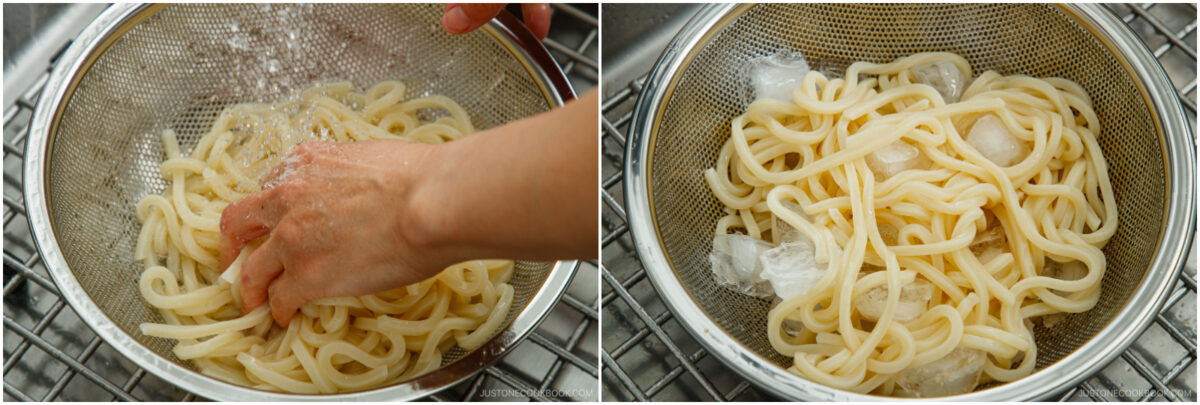
To Prepare the Condiments
- Cut 1 green onion/scallion into thin slices. Peel and grate ½ inch ginger; I use a ceramic grater. Put sliced green onion, grated ginger, and optional wasabi on individual small plates.
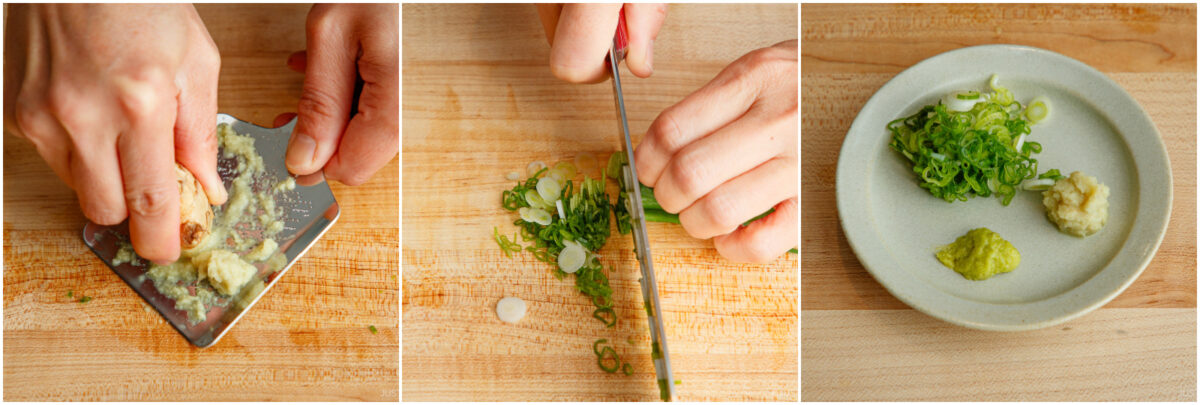
To Serve
- Drain the chilled udon noodles well. Divide onto individual serving plates along with a few of the ice cubes. Divide the cooled tsuyu sauce into individual dipping cups. Serve the cold udon noodles and dipping sauce. Add the condiments directly to the dipping sauce and enjoy.
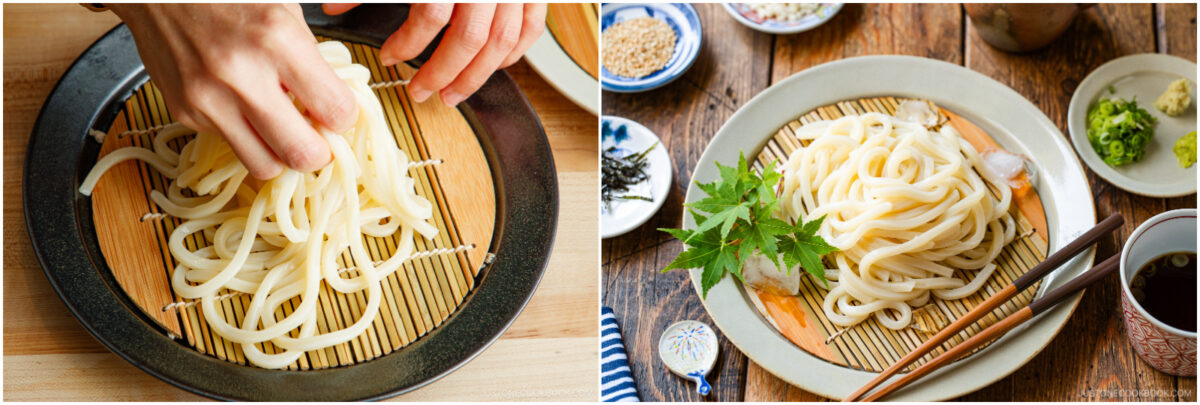
To Store
- Store leftover dipping sauce in a clean, airtight container in the refrigerator for up to a week. I recommend cooking the udon noodles just before serving.
(Optional) To Make the Quick Dipping Sauce (4 servings)
- Add ½ cup mentsuyu (concentrated noodle soup base), 1 piece kombu (dried kelp), and ½ cup katsuobushi (dried bonito flakes) to a measuring cup or container. Let it steep for at least 10 minutes or overnight in the fridge. Drain the mentsuyu through a sieve (discard or repurpose the kombu and katsuobushi). To use: Dilute with 1½ cups water, then serve into individual dipping cups.
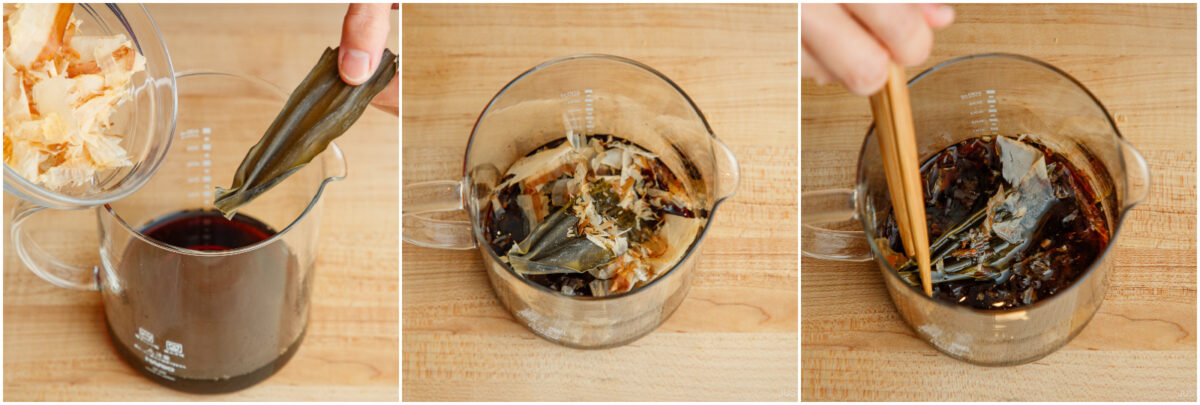
- Nami's Tip: The mentsuyu brand I use is concentrated 3 times for cold noodle dipping sauce (men no tsuketsuyu). The dilution ratio is one part mentsuyu to three parts water (1 : 3). Follow your bottle's dilution instructions, as each brand is different. If you have “straight” mentsuyu, use it as is without diluting.
Nutrition
Did you make this recipe?
Tag @justonecookbook on Instagram so we can see your delicious creation!



